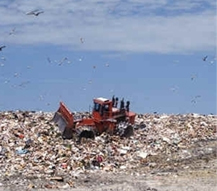Landfill Allowance Trading Scheme
In England LATS were used until 31st March 2013[i]. After this date they were ended with landfill tax being utilised to reduce waste sent to landfill. In Wales, Scotland and Northern Ireland the scheme is known as the Landfill Allowances Scheme (LAS) and all of these programmes are still in place as of early September 2014.
The Landfill Allowance Trading Scheme (LATS) and Landfill Allowance Schemes (LAS) have been developed to enable the UK to meet the Landfill Directive targets of reducing the amount of biodegradable municipal waste (BMW) being sent to landfill in a cost effective way. Reducing the amount of BMW going to landfill will reduce the amount of landfill gas released into the atmosphere and help protect the environment.
Natural Resources Wales (NRW) is responsible for monitoring the LAS performance in Wales[ii]. The Scottish Environment Protection Agency (SEPA) are responsible for monitoring LAS in Scotland[iii]. The Northern Ireland Landfill Allowance Scheme (NILAS) is monitored by the Northern Ireland Environment Agency[iv].

Various tools have been developed to help local authorities calculate the amount of BMW they have sent to landfill:
The amount of BMW in the solid municipal waste for monitoring purposes is estimated to be 61% (by weight) in Wales. These values are used to calculate the landfill allowance. However in practice the amount of BMW present in municipal solid waste (MSW) varies from authority to authority.
Recording LAS and LATS data:
All local authorities record their waste data on to the web-based online reporting system WasteDataFlow[v]. WasteDataFlow is a system that was developed to help local authorities, regulators and government monitor waste statistics for the public sector.
Some key advantages of WasteDataFlow are:
- A more accurate data collection of municipal waste statistics;
- Enhancement of local data management for reporting and strategic planning purposes;
- Offering local authorities streamlined access to performance benchmarking with other authorities;
- Monitoring progress towards national and local targets;
- In particular to enable waste disposal authorities to meet their requirement to report quarterly data to the Environment Agency under the relevant regulations.
Furthermore, any landfill site operators which accept biodegradable municipal waste will have to provide returns to the appropriate authority. This must include information on the types and quantities of waste that they are receiving and where the municipal waste came from.
If a WDA does not provide the correct data or it fails to provide any data at all to the relevant regulator, then the relevant regulator can serve a notice to the authority and this will result in the authority being fined.
If a WDA exceeds its allocated BMW tonnage for landfill then it could receive a financial penalty for every tonne that is landfilled over the allocated allowance. If the United Kingdom as a whole does not meet the national diversion targets, then the WDAs that have gone over their allowance could be faced with an additional fine.
References
[i] Lets Recycle, 02 April 2013. End of LATS as landfill tax hits £72 per tonne [Online] http://www.letsrecycle.com/news/latest-news/waste-management/landfill-tax-hits-ps72-per-tonne [Last accessed 03/09/2014]
[ii] NRW, 2014.Landfill Allowance Trading Scheme[Online] http://naturalresourceswales.gov.uk/policy-and-guidance/waste-policy/landfill-allowance-scheme/?lang=en [Last accessed 03/09/2014]
[iii] SEPA, 2014. Landfill Allowance Scheme [Online] http://www.sepa.org.uk/waste/waste_data/lacw/landfill_allowance_scheme.aspx [Last accessed 03/09/2014]
[iv] DOENI, 2014. Northern Ireland Landfill Allowance Scheme (NILAS). http://www.doeni.gov.uk/nilas [Last accessed 03/09/2014]
[v] WasteDataFlow, 22nd January 2013. WasteDataFlow Waste Management [Online] http://www.wastedataflow.org/ [Last accessed 03/09/2014]